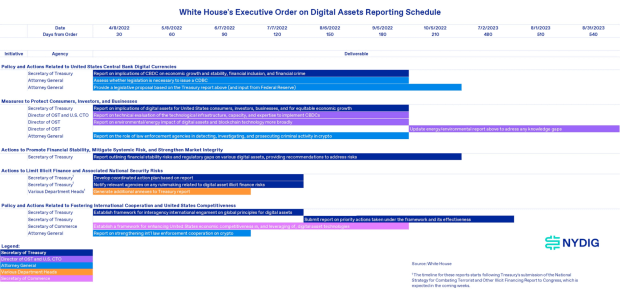Will U.S. President Joe Biden’s executive order calling for regulatory guidelines around Bitcoin help or hurt the technology?
U.S. President Joe Biden signed an executive order (E.O.) yesterday outlining federal efforts to research and develop specific guidelines for the use of bitcoin, alternative cryptocurrencies and a possible Federal Reserve central bank digital currency (CBDC) as the country seeks to remain at the core of the global financial system.
“With respect to digital assets, my Administration will seek to ensure that our core democratic values are respected; consumers, investors, and businesses are protected; appropriate global financial system connectivity and platform and architecture interoperability are preserved; and the safety and soundness of the global financial system and international monetary system are maintained,” the order reads.
Is Biden Trying To Kill Bitcoin?
The order highlights how the U.S. benefits from the current world monetary order and how its best interest is to maintain that leverage. The Biden administration sees a U.S. CBDC as a possible catalyst for a stronger nation — which could help it outcompete advanced global digital payment developments from China — while it poses questions regarding alleged “risks” that more “private” cryptocurrencies like bitcoin could pose to the same efforts.
“There clearly is a faction that feels urgency to push a CBDC,” national security fellow at the Bitcoin Policy Institute (BPI), Matthew Pines, told Bitcoin Magazine. “They’ll run into a lot of resistance at the Fed and Congress.”
Biden’s E.O. calls for an overhaul policy mechanism through a collaborative task force between several regulatory agencies as it seeks to determine and adapt to what his administration sees as risks posed by Bitcoin to national security objectives of the United States.
“Growth in decentralized financial ecosystems, peer-to-peer payment activity, and obscured blockchain ledgers without controls to mitigate illicit finance could also present additional market and national security risks in the future,” per the executive order.
Bitcoin advocate Senator Cynthia Lummis argued in a Wednesday statement that, while she agrees with the president’s push to combat money laundering and defend the country’s national security needs, she thinks “his executive order misses the fact that the overwhelming majority of digital asset users are law-abiding and trying to make our financial system better.”
Chainalysis last month published a report highlighting a current downtrend in the criminal use of Bitcoin. According to the blockchain analysis company’s research data, “illicit activity’s share of cryptocurrency transaction volume has never been lower.”
Congressman for Minnesota Tom Emmer echoed Lummis’ comments in a Wednesday Twitter thread.
“The EO doesn’t mention decentralization once,” he wrote. “Given this Admin’s regulatory posture toward the crypto community, we have no reason to assume that the directives in the EO will yield results that appropriately acknowledge the importance of leading w. digital asset policies that prioritize open, permissionless, & private tech.”
Could Regulation Help Bitcoin Thrive In The U.S.?
Kristin Smith, the executive director of the Blockchain Association, a Washington D.C.-based trade association representing prominent cryptocurrency organizations, sees the Biden executive order in a positive light, as she argues it opens the door for dialogue and responsible devising of Bitcoin and cryptocurrency regulation.
“This is an incredibly positive statement,” she said in a Wednesday Twitter Space. “We’ve basically had the President of the United States [say] that U.S. competitiveness in the digital asset arena is important and that we should create policies that foster this. This is quite a big change from the last administration where you had Trump tweeting bad things about Bitcoin.”
Smith also highlighted the “thoughtful and methodical process” the executive order lays out for evaluating this market rather than jumping on premature conclusions without due study.
“This is actually a really good way to make policy,” she said.
By design, the executive order currently does little to achieve specific results on Bitcoin and cryptocurrency legislation. Rather, it seeks to establish a more formal and coordinated conversation among regulatory agencies and federal bodies to assess the risks and opportunities in the market, requesting that they report back with their findings.
“[The executive order] should kick off a period of dialogue between stakeholders and the federal agencies as they’re looking at this space and it doesn’t prejudge what the policy solution should be,” Smith added.
Energy is one of such areas that Biden has requested careful research from agencies. The administration is interested in policy that “reduces negative climate impacts and environmental pollution, as may result from some cryptocurrency mining.”
The call for a deeper study on mining is important as most U.S. lawmakers have shown a lack of sufficient knowledge on proof of work (PoW). In January, the U.S. House of Representatives held a hearing on the bitcoin mining industry and its possible effects on the environment. However, out of the five witnesses who joined to testify and aid lawmakers in developing a better understanding of the industry, only two demonstrated a good understanding of Bitcoin’s PoW consensus mechanism and its importance.
Consensus mechanisms other than PoW “reintroduce the centralized concept of trust,” witness John Belizaire, CEO of Soluna Computing, told Bitcoin Magazine in an interview after the hearing.
“On the one hand you say [bitcoin mining] uses all of this energy, but it could be the catalyst for renewable energy… there are billions of dollars being stored in it every day, and… it’s launching all of this ecosystem and financial services,” Belizaire added.
How The Bitcoin Community Can Guide U.S. Policy
In fact, the dividing line between Bitcoin’s innovation, PoW, and other cryptocurrency consensus mechanisms like proof of stake (PoS) is an area that should be covered by those with whom the federal agencies talk. By bundling Bitcoin with PoS cryptocurrencies into the same basket, much of the debate’s quality can be lost as intrinsic differences between the two get blurred in an overarching “crypto” or “digital assets” discourse.
Such a narrative could lead some regulators to believe that PoW isn’t necessary and its energy consumption isn’t justifiable, something also evidenced in January’s bitcoin mining hearing in the House, when lawmakers suggested that Bitcoin could switch to PoS for climate change’s sake.
Bitcoin “can’t take the risk to shift” to PoS, a consensus mechanism that “may actually undermine what has given [Bitcoin] its strength and growth,” Belizaire told Bitcoin Magazine at the time.
In this sense, Pines’ call for the Bitcoin community to unite and help shed light on the importance of PoW and how it solves the issues inherent in a trust-based financial system may be more important than ever.
“They are trying to understand what are the climate impacts and whether the positives outweigh the negatives,” said Margot Paez, also a fellow at the BPI, in a Wednesday Twitter Space.
While most lawmakers and mainstream media reports have focused on the alleged negatives of bitcoin mining’s energy consumption, Brian Brooks, CEO of bitcoin miner Bitfury and former acting comptroller of the currency, provided examples in his January testimony in the House for how Bitcoin can actually help the energy economy of the United States.
“Bitcoin… is like an energy derivative, it provides real-time price signals to the market about the most valuable use of energy in a given place,” Brooks said at the time. “The vast majority of industrial-scale bitcoin miners are the price transmission belt for all of the energy globally.”
Biden’s order acknowledges this reality as it calls for deeper research into the possibilities enabled by having a baseload energy consumer like Bitcoin in the U.S. energy grids. The president requested a report from competent agencies to address, among other things, “implications for energy policy, including as it relates to grid management and reliability, energy efficiency incentives and standards, and sources of energy supply.”
Paez told Bitcoin Magazine that it is unclear what direction Biden and the federal agencies will take as they finalize their research and start drafting out policies on the matter, and whether the U.S. will keep being a welcoming place for the industry.
“It’s hard to say because politicians looking for a political win that turns into votes can be based not in facts but in emotions,” she said. “That being said, the E.O. at least acknowledges that there could be gains from integrating PoW into the grid so that means there is more openness.”
Paez added that a more developed and integrated mining ecosystem will prove harder to ban in case the Biden administration takes the unlikely route.
“The more integrated mining is onto the grid, serving an essential role, the harder it will be to ban it,” she said.
Issues could arise from a unilateral move by the U.S. government that drifts favorably toward a CBDC and negatively toward Bitcoin and its decentralized foundations. It is still unclear whether that would be the case, but broader efforts in the Bitcoin community have the potential to turn the tide of such an event.
“This is the starting gun for a lot of people to try to shape what these various reports say, and those fights will happen in the trenches inside various agencies, with outside lobbyists, congressional pressure,” Pines told Bitcoin Magazine. “[The] Bitcoin community needs to get more sophisticated in our understanding of the policy process and ensure accurate facts (about energy/climate, national security, CBDC risks, etc.) are presented to the right people.”
Pines added that the BPI plans to continue publishing reports, editorials and research papers to shed light on factual information that may help drive good policy, even though it is not a lobbying group.
“The government really lacks deep expertise in this area and will need to turn to trusted sources of information to guide their work,” Pines said. “Bitcoin is disadvantaged in this regard as we don’t have a CEO to call, or a PR shop with a lobbying arm. But we have plebs. That broad energy is important to generate political juice, but we also need to provide objective data and analysis.”
Pines is also a management consultant with over ten years of experience advising the U.S. government and the private sector on critical security and resilience challenges. He published an extensive report on Tuesday outlining how, contrary to the U.S. government’s potential view, Bitcoin can actually empower the country to achieve its national security objectives.
“The U.S. is exceptionally well-poised to take unique advantage of the opportunity presented by the emergence of Bitcoin and use it to help promote a more abundant and resilient future,” he wrote in the report. “A world where Bitcoin fails is a world where U.S. retrenchment and decline is more likely.”
Biden’s initial move could be a net positive for Bitcoin as it legitimizes the market to the eyes of the skeptical U.S. citizen by bringing it to the forefront of national policy. However, the end result might depend largely on the effectiveness of industry players and the Bitcoin community in combating mainstream fear mongering and misconceptions about energy usage of mining and the network’s peer-to-peer and decentralized nature.
“The fight will be in the trenches on things like PoW effect on energy/climate, stablecoin versys CBDC, and SEC [U.S. Securities and Exchange Commission] versus CFTC [Commodity Futures Trading Commission] authorities,” Pines said. “Responding to public comments or providing fact sheets or other informed input is how we will ensure government policy is well formed.”





















